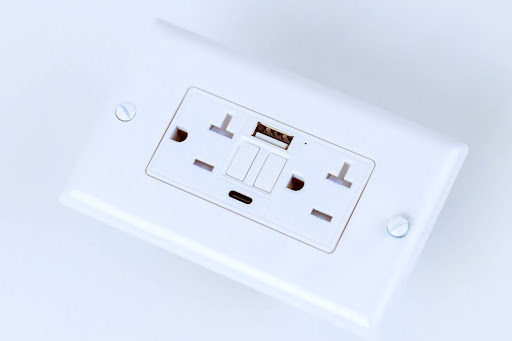Your home deserves protection from every angle. It’s where your family lives, plays, and makes memories. But not all dangers are visible. Electrical issues can lurk behind your walls, in your outlets, or near appliances, posing risks like shock or fire. The good news is that technology exists to help prevent these problems before they become serious. Understanding the difference between AFCI and GFCI outlets is key to knowing how to keep your home and family safe.
We’ll walk you through how AFCI and GFCI outlets work and why both are important. We’ll also look at where each should be installed and how they work together to improve safety.
What Are AFCI vs. GFCI Outlets?
AFCI and GFCI outlets both help prevent electrical hazards, but they safeguard against different types of problems. AFCI stands for arc-fault circuit interrupter. GFCI stands for ground-fault circuit interrupter. If you’re thinking about upgrading outlets in your home or adding new ones during a remodel, understanding AFCI vs. GFCI outlets helps you make the right choice.
The difference between AFCI and GFCI outlets has everything to do with what they respond to. AFCI detects arcs in wiring that could lead to fires. GFCI monitors for electricity that escapes its intended path and could result in a shock. Knowing the difference between arc-fault circuit interrupters and ground-fault circuit interrupters helps you know where each one fits best.
How AFCI Protects Against Electrical Fires
Arc-fault circuit interrupters are designed to shut off power when they detect a potentially dangerous arc. An arc happens when electricity jumps from one wire to another due to damaged insulation, loose connections, or pinched wiring. These arcs can create heat and sparks, which can lead to a fire.
You might not see or hear these arcs, especially if they’re happening behind a wall. That’s why AFCI outlets and breakers are required in many parts of the home. Understanding AFCI vs. GFCI protection means realizing that AFCI is your first line of defense against an electrical fire.
How GFCI Helps Prevent Electrical Shock
Ground-fault circuit interrupters protect people from shock. They constantly compare the amount of electricity flowing into a circuit with what’s flowing out. If even a small amount leaks, the GFCI cuts power right away.
This type of protection is particularly important in areas where electricity and water are close together. Places like bathrooms, kitchens, and laundry rooms often require GFCI outlets. The difference between arc-fault circuit interrupters and ground-fault circuit interrupters becomes clear here. While AFCI responds to internal wiring problems, GFCI responds to problems that could put someone in direct danger.
Where You Need AFCI vs. GFCI Protection
Different rooms in your home present different electrical risks. Understanding which protection is required in each space helps you make informed decisions about installation and upgrades. This section explains how AFCI vs. GFCI protection is used in specific parts of your home.
Bathrooms and Near Sinks
Any outlet near water sources should use GFCI protection. In bathrooms, this includes outlets near the sink, shower, or tub. Water can cause current to stray from its intended path, increasing the risk of shock. Installing GFCI outlets in these spaces helps reduce that risk.
Kitchens and Laundry Areas
Kitchens and laundry rooms feature appliances like dishwashers, washing machines, and refrigerators. These appliances are often near sinks or water lines, which makes them prime spots for GFCI outlets. GFCI protection is essential here, but AFCI may also be required to guard against internal wiring problems that can lead to fire.
Bedrooms and Living Areas
Bedrooms, living rooms, and dining rooms may not have water exposure, but they do have plenty of wiring in the walls. Older wires, loose screws, or damaged outlets can cause arcs that are a fire hazard. AFCI outlets or breakers are typically required in these rooms under the current electrical code.
Garages and Basements
Garages and basements tend to be damp or unfinished, which means GFCI protection is a must. These spaces often have lighting, tools, or air conditioning equipment connected to the power supply. If electrical faults occur in these environments, the GFCI will cut power and help prevent injury.
Why the Difference Between AFCI and GFCI Outlets Matters
AFCI and GFCI serve two different but equally important functions. Learning about the difference between arc-fault circuit interrupters and ground-fault circuit interrupters helps you avoid relying on one type of protection for all risks.
Each type of outlet has its place in the home. By installing both where appropriate, you can reduce the chance of fires and shocks significantly. Many homeowners assume one or the other is enough. In reality, AFCI and GFCI protection works best as a team.
National Electrical Code Requirements
The National Electrical Code outlines where AFCI and GFCI protection is required. These rules change over time, especially as new technology and risks are better understood. Bedrooms and other living spaces now typically require AFCI, while areas with moisture require GFCI.
If you’re installing outlets, it’s smart to work with local professionals who understand these requirements. ServiceWise Electric & Plumbing keeps up with code updates and applies them during installation or remodeling.
Choosing the Right Outlet for the Job
Selecting the right outlet means looking at both the room and the potential risk. The type of protection you need depends on whether the danger is shock from moisture or fire from faulty wiring.
Think about what the room is used for. Bedrooms and hallways benefit from AFCI protection. Bathrooms and kitchens need GFCI outlets to handle potential water-related issues. Some places, like basements or garages, may benefit from both.
Combination AFCI/GFCI outlets are also available. These offer both types of protection in one unit. They are ideal for places like laundry rooms or kitchens where both shock and fire risks are present.
How AFCI and GFCI Devices Are Installed
Installing AFCI and GFCI outlets can be straightforward, but they should be handled carefully. Mistakes in wiring or setup can reduce effectiveness. That’s why it’s always best to consult licensed electricians for the job.
The installation process generally involves turning off the power, removing the old outlet, connecting the wires properly, and testing the new outlet. GFCI outlets come with a test and reset button. AFCI breakers or outlets also have test buttons and will trip under arc conditions.
For the safest results, it’s important to match the outlet type to the wiring in your home and make sure everything is grounded correctly.
Why Homeowners Should Pay Attention
Understanding AFCI vs. GFCI outlets helps homeowners make smart choices about upgrades and repairs. If a breaker trips often, lights flicker, or an outlet near water isn’t working, these could be signs that your home needs better protection.
Homes built before current code requirements may lack proper outlet protection. Modernizing your system helps reduce fire and shock hazards and could even help with insurance rates. If you’re adding new outlets in Canton, GA, ServiceWise Electric & Plumbing can help with the process.
Trust a Local Expert With the Right Experience
At ServiceWise Electric & Plumbing, we believe every homeowner should feel confident in their home’s electrical safety. We’re a family-owned company with decades of experience serving homes and businesses in metro Atlanta. Our electricians in Canton are licensed, insured, and trained to handle everything from a simple outlet upgrade to a full electrical remodel.
If you’re not sure which type of outlet you need or want to make sure your home meets current safety standards, we’re here to assist you. We install AFCI and GFCI outlets based on your home’s layout and needs. We follow all National Electrical Code guidelines and offer friendly, straightforward service.
Let’s protect your home from electrical faults, fire risks, and shock hazards. Contact us today to schedule your appointment! We’ll install the right protection in the right places, so you can relax, knowing your family and home are in good hands.

